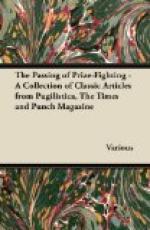* * * * *
If you happen to remember that most excellent book, Brother-in-Law to Potts, you may recall that the principal motive in it is the spiritualising influence of a certain Lady Beautiful, very lightly and even intangibly presented, on the lives of some other persons of a more material clay. In Obstacles (CHAPMAN AND HALL), Mrs. “PARRY TRUSCOTT” has returned to her previous subject, but with the notable difference that she now traces the influence brought in turn to bear upon the lady herself, who emerges from her semi-divine obscurity to become the heroine of the story. If in her background sketch of the munitions factory where Susannah elects to work the writer does not trouble much about technical detail or even attempt to suggest any particular acquaintance with such matters as lathes or shell bodies, yet she does convey, with striking simplicity and naturalness, the impression of a world at war, and for the rest she is content to bring her heroine in contact with the lives that are to affect her and the environment of comparative poverty that is to help her to a decision. What that decision was, and how unnecessary too, is sufficiently indicated if I say that she was blessed with most understanding parents, who positively preferred that her suitor should be a poor man. And so the happy future that surely no authoress and most certainly no male reader could have the heart to refuse to so delightful a Susannah is available to complete a picture touched throughout with singular grace and charm. In particular the little snap-shots of two ideal family households, the one that includes the heroine, and another, much humbler, which she enters as an honoured guest, go to make this volume, all too short though it is, one that I can recommend with quite unusual pleasure and confidence.
* * * * *
[Illustration: Waitress. “NO, SIR, THE MANAGEMENT ’AS NO REASON TO THINK THAT LORD DEVONPORT REGARDS BUBBLE AND SQUEAK AS TWO COURSES.”]
* * * * *
OUR CITIZEN SOLDIERS.
“Lord George H. Cholmondeley,
M.C., Hotts Royal Horse
Artillery, who has just been
promoted to the rank of mayor in
that Territorial Corps.”—Cheshire
Observer.




